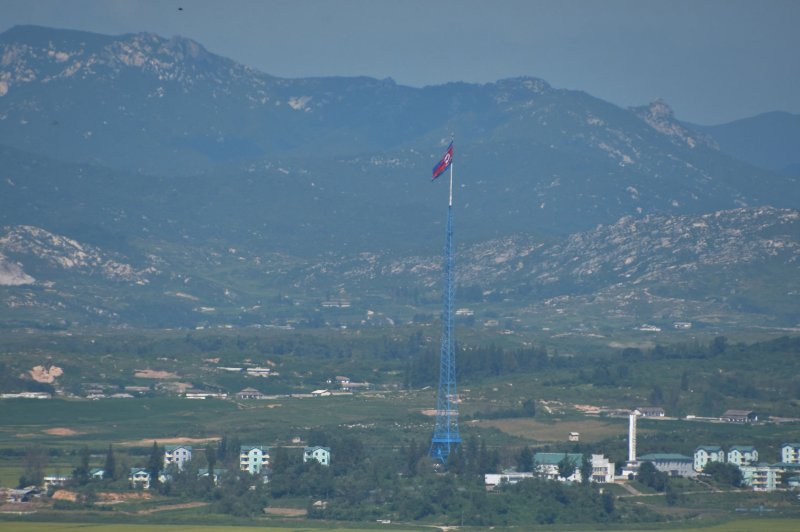North Korea is believed to have abducted citizens from Japan, Romania, Thailand, South Korea and the United States beginning in the 1970s. File Photo by Keizo Mori/UPI |
License Photo
UNITED NATIONS, June 29 (UPI) -- The brother of an American student suspected to have been abducted to North Korea in 2004 said evidence exists that David Sneddon did not die in a hiking accident in Yunnan Province.
James Sneddon, speaking at an online symposium at the United Nations on North Korea's alleged abductions of foreign nationals, said Tuesday that his brother spoke many times of a desire to come home after completing his studies at a university in Beijing.
David Sneddon, who was fluent in Korean and lived for a time in Seoul as a Mormon missionary, may have drawn the attention of North Korean agents operating in Yunnan, an area used by North Korean refugees as a point of access to safer havens, including Laos.
James Sneddon did not disclose specific evidence that his brother encountered North Korean spies during what was supposed to be a hiking holiday in Tiger Leaping Gorge, a spectacular canyon on the Jinsha River in China's southwest.
A friend, another American, joined David Sneddon, but left early while he continued on to Tiger Gorge. David frequently emailed his family in August, providing vivid details of his travel plans, but also expressing excitement about coming home.
When he became unreachable, James Sneddon said, the family set out to China, accompanied by U.S. Embassy personnel.
The Sneddons searched frantically for clues of David Sneddon's whereabouts and met a group of tourists who said a young "westerner" who had "studied Mandarin at university" joined them about three hours in August, before striking out on his own.
An ethnic Korean woman who owned a café in the mountain region also correctly identified David Sneddon. According to James Sneddon, the café proprietor conversed with his brother in Korean.
The woman described David Sneddon as having "meager funds." After multiple visits to her shop, he reportedly told her, "Goodbye, I am leaving," as he prepared to return home, James said.
Evidence that David Sneddon was taken to North Korea has been hard to come by more than a decade after his disappearance.
China has claimed the American fell into the Jinsha River, but James Sneddon said during his 2004 search operation at the Gorge that he noticed the hiking trail was situated more than a mile from the river, making an accident unlikely. David Sneddon's body was never recovered at the site.
The Sneddon story is one of many among the families of abductees who suspect their loved ones were forcibly taken to North Korea.
Other families joined James Sneddon on Tuesday, including activists in Japan and relatives of alleged victims from Thailand and Romania.
Gabriel Bumbea, the brother of Doina Bumbea, a Romanian national, said a "mysterious Italian citizen" was involved in the kidnapping of his sister in the '70s.
Bumbea said his sister was forced into a marriage with a U.S. soldier, who defected to North Korea across the demilitarized zone in 1962.
James Joseph Dresnok, who is believed to have died in the North in 2016, had two sons with Doina Bumbea. The woman died of lung cancer in 1997 in Pyongyang at age 47, Gabriel said. Her two sons were featured in an interview with a visitor to North Korea in full Korean People's Army uniform in 2017.
Doina Bumbea was cremated, but her family has no information about the location of her ashes. According to Gabriel, the Romanian government knew of her whereabouts since 1991, but did not reach out to the Bumbeas.
The patterns of suspected North Korean abductions indicate victims may have been handpicked to meet the regime's needs at specific moments in history. Doina Bumbea may have been selected because Pyongyang wanted to reward Dresnok with a wife, according to analysts.
North Korea's abductions have become a focal point of policy in Japan, where Chief Cabinet Secretary Katsunobu Kato also is the minister in charge of the abduction issue.
Kato said Tuesday at the symposium that Prime Minister Yoshihide Suga continues to offer to meet with Kim Jong Un without preconditions to move toward the "resolution of the abduction issue."
Anger prevailed among some members of the families of the victims, however.
Takuya Yokota, the brother of Japanese abductee Megumi Yokota, said Tuesday that his father, Shigeru Yokota, died last year without ever seeing his daughter again after she disappeared in 1977 at age 13.
"I feel sorry," Yokota said, "He may have wanted to hug my sister in his arms. We cannot forgive North Korea for being so cruel."















